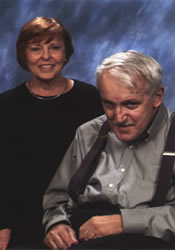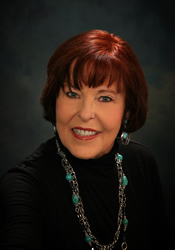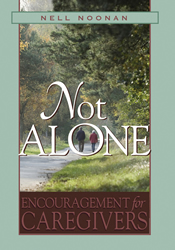Why, oh, why do caregivers think they have to do everything by themselves? Is it our rugged American individualism or some kind of arrogant stoicism and pride that makes us believe our journey as caregivers must be a solo venture?
According to November 2012 statistics from the National Alliance for Caregiving and AARP, I am one of 65.7 million unpaid caregivers for family or friends in the United States. I imagine that the majority, like me, have a hard time asking for help.

Nell Noonan and her late husband, Bob.
Photo courtesy Nell Noonan..
I was well into the seven and a half years of my caregiving odyssey with my husband before I stopped saying, "No, thanks; we're doing just fine." Truthfully, I was sleep deprived, depressed, sad, stressed and heartsick. Year after year after year, I watched a truly good human being suffer in excruciating pain. I also had a torn rotator cuff and bad back from physically assisting my 220-pound husband from bed to lift chair to wheelchair.
If that sounds like a pity party, some days it was; but I thank God for the church family, relatives and friends who would not let us sink, when the storm winds blew and our boat was filling with roiling waves. I found it difficult to accept help and kindnesses from others, to allow someone to show loving generosity toward me. I am a giver, and it was uncomfortable being a receiver, until Judy, a lovely, bubbly member of my church, taught me a valuable lesson.
One Sunday, Judy approached me during coffee hour after worship and asked how I was doing. It was always about Bob -- his health, his pain, his hospitalizations, so I was surprised when she commented, "You look tired. I'm bringing you supper tomorrow."
"Oh, you don't need to do that," I replied. "I'm OK, and everyone has been so generous when Bob was so seriously ill. We're past the critical stage and rocking along OK now. Thanks for your thoughtful offer, but we're fine."
Softly, but firmly, Judy stated, "I'm bringing you supper tomorrow."
The next morning Bob fell. Nine staples and five hours later, we returned home from the ER. Late in the afternoon, the doorbell rang. Judy stood at the door with a picnic basket. As she unpacked the gourmet feast, I felt overwhelmed and ashamed that I had tried to shut her out of my pain. I realized I needed a friend and her gift of comfort food.
She listened quietly as my feelings came rushing out. Judy said, "Please, Nell, don't rob Jesus' friends of the gift of being his friends for you and Bob." From that day forward, I let go of my sin of self-reliance and learned the joy of receiving graciously and gratefully.
I tell you this story because I was one of those who thought I was imposing, showing weakness, shirking my duty or some other silly idea that caregivers seem to harbor. They will not let themselves ask for help; family and friends often have no clue about the challenges and daily struggles a caregiver faces.
Love, empathy and devotion drive caregivers, but those dear people often experience despair, fatigue, depression, anger, frustration, isolation and guilt about their feelings. Caregivers need the assistance of friends, support groups, churches, family and professionals. They need to discover ways to connect with others while others need to discover ways to connect with them. Do not take their "no's" as the final word to your offers of help. Like Judy, show up anyway. It works -- especially if you bring a glorious chicken pot pie.
In addition to providing occasional meals, here are some other ways for individuals and congregations to provide help to caregivers and those for whom they care.
- Encourage visits from clergy, family and friends. A few minutes are sufficient.
- Take Holy Communion to the homebound. Develop a regular schedule.
- Develop a one-on-one caring relationship with a lay minister/church friend for both the care receiver and the caregiver. Stephen Ministry is an outstanding program for training and supervising laity to provide free, confidential caring that does not try to fix problems but offers Christian companions for people going through challenging times.
- Send cards and notes. My husband treasured encouraging correspondence and kept them in his overflowing nightstand drawer.
- Show little kindnesses such as bringing garden flowers; picking up library books and CDs; walking the dog once a week; cleaning the fridge; providing prayer shawls, lap quilts or small pillows; making phone calls; and offering financial support for sitters.
- Form support groups. First United Methodist Church, Fort Worth, Texas, gathers caregivers of people with Parkinson's or Alzheimer's disease, other dementia and so forth for two-hour sessions twice a month. The church provides trained sitters to watch care receivers during meetings as they engage in board games, arts, crafts and music; have a snack; and socialize. The caregiver sessions include an educational component as well as sharing time. Many people continue to attend after their loved one dies, providing wisdom and encouragement to those still on the caregiving journey.
- Provide resources such as a church library shelf of books like The 36-Hour Day and videos; lists of local professional caregivers, senior services and retirement and nursing home facilities. The National Alliance for Caregivers has an excellent website: www.caregiving.org.
- Offer workshops, symposiums and programs provided by local or state councils on aging and other government agencies. These were immensely helpful to me.
- Hire a coordinator of senior ministries. Some churches are now hiring someone to coordinate and expand volunteer ministries with, by and to seniors and other people in need.
- Invite hospice companies to provide programs. Some also offer respite opportunities and grief support programs. They focus on the family as well as the patient with a team that includes a chaplain, a social worker and medical personnel.

Nell E. Noonan
Photo courtesy Nell Noonan.
Caregivers are notorious for neglecting their physical, mental and emotional needs -- and their spiritual well-being. Encourage them to carve out time and space to nurture their spiritual health through daily sessions of Scripture reading, meditation and prayer. Give caregivers devotional books and a journal for recording thoughts and feelings.
Within God-times, caregivers allow their hurting hearts and weary souls to meet God at the deepest level of their being. When caregivers invite God to be a partner with them in their struggles and suffering, a wondrous thing happens: God consoles, loves, cares and strengthens as only God can. I know firsthand God is there with us in the tears, the laughter, the exhaustion and the blessings.
God is with caregivers on their journey. Church family, relatives and friends can be there, too.
Please offer to help. Make sure no caregiving pilgrimage becomes a solo venture. With gratitude for those who helped me, I propose an additional beatitude: Blessed are the compassionate hearts who care for caregivers.

Book cover of 'Not Alone: Encouragement for Caregivers'
Photo courtesy The Upper Room..
About Nell Noonan
Nell Noonan now lives in Durham, N.C., where she is part of The Congregation at Duke University. Noonan has written two books published by The Upper Room. Not Alone: Encouragement for Caregivers is a hardcover book of 150 devotions, filled with stories, practical suggestions and theological reflection drawn from her experience caring for her late husband, Bob, as well as those of friends and support group members. A Scripture passage and prayer accompany each story. The Struggles of Caregiving has 28 devotions in workbook format and is part of The Upper Room's 28 Days of Prayer series. She is now working on a book of devotions for widows.
Like what you're reading? Support the ministry of UM News! Your support ensures the latest denominational news, dynamic stories and informative articles will continue to connect our global community. Make a tax-deductible donation at ResourceUMC.org/GiveUMCom.

